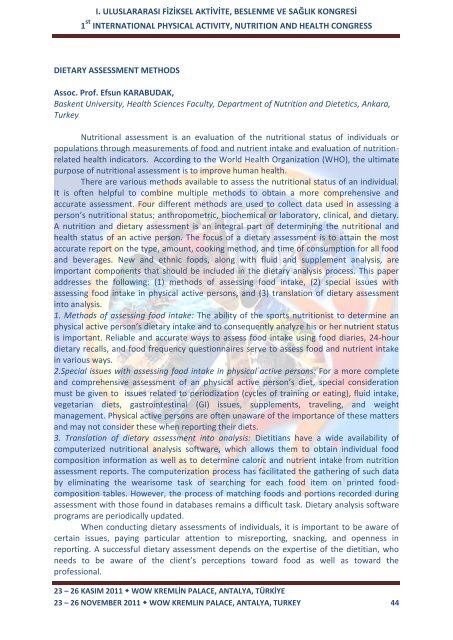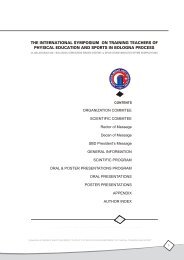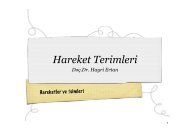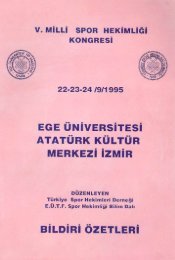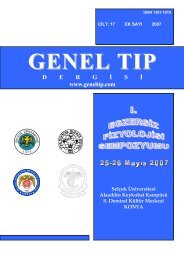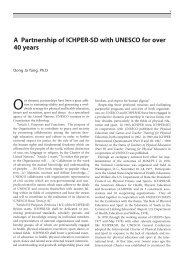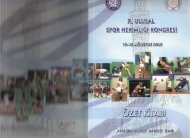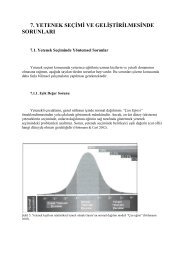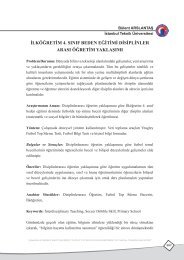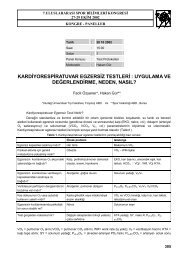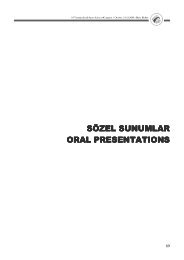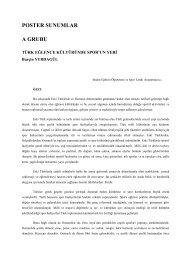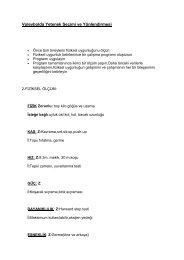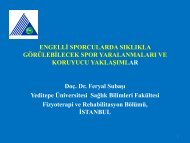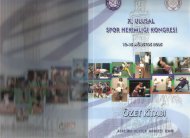POSTER BİLDİRİLER - Spor Bilim
POSTER BİLDİRİLER - Spor Bilim
POSTER BİLDİRİLER - Spor Bilim
You also want an ePaper? Increase the reach of your titles
YUMPU automatically turns print PDFs into web optimized ePapers that Google loves.
I. ULUSLARARASI FİZİKSEL AKTİVİTE, BESLENME VE SAĞLIK KONGRESİ<br />
1 st INTERNATIONAL PHYSICAL ACTIVITY, NUTRITION AND HEALTH CONGRESS<br />
DIETARY ASSESSMENT METHODS<br />
Assoc. Prof. Efsun KARABUDAK,<br />
Baskent University, Health Sciences Faculty, Department of Nutrition and Dietetics, Ankara,<br />
Turkey<br />
Nutritional assessment is an evaluation of the nutritional status of individuals or<br />
populations through measurements of food and nutrient intake and evaluation of nutritionrelated<br />
health indicators. According to the World Health Organization (WHO), the ultimate<br />
purpose of nutritional assessment is to improve human health.<br />
There are various methods available to assess the nutritional status of an individual.<br />
It is often helpful to combine multiple methods to obtain a more comprehensive and<br />
accurate assessment. Four different methods are used to collect data used in assessing a<br />
person’s nutritional status; anthropometric, biochemical or laboratory, clinical, and dietary.<br />
A nutrition and dietary assessment is an integral part of determining the nutritional and<br />
health status of an active person. The focus of a dietary assessment is to attain the most<br />
accurate report on the type, amount, cooking method, and time of consumption for all food<br />
and beverages. New and ethnic foods, along with fluid and supplement analysis, are<br />
important components that should be included in the dietary analysis process. This paper<br />
addresses the following: (1) methods of assessing food intake, (2) special issues with<br />
assessing food intake in physical active persons, and (3) translation of dietary assessment<br />
into analysis.<br />
1. Methods of assessing food intake: The ability of the sports nutritionist to determine an<br />
physical active person’s dietary intake and to consequently analyze his or her nutrient status<br />
is important. Reliable and accurate ways to assess food intake using food diaries, 24-hour<br />
dietary recalls, and food frequency questionnaires serve to assess food and nutrient intake<br />
in various ways.<br />
2.Special issues with assessing food intake in physical active persons: For a more complete<br />
and comprehensive assessment of an physical active person’s diet, special consideration<br />
must be given to issues related to periodization (cycles of training or eating), fluid intake,<br />
vegetarian diets, gastrointestinal (GI) issues, supplements, traveling, and weight<br />
management. Physical active persons are often unaware of the importance of these matters<br />
and may not consider these when reporting their diets.<br />
3. Translation of dietary assessment into analysis: Dietitians have a wide availability of<br />
computerized nutritional analysis software, which allows them to obtain individual food<br />
composition information as well as to determine caloric and nutrient intake from nutrition<br />
assessment reports. The computerization process has facilitated the gathering of such data<br />
by eliminating the wearisome task of searching for each food item on printed foodcomposition<br />
tables. However, the process of matching foods and portions recorded during<br />
assessment with those found in databases remains a difficult task. Dietary analysis software<br />
programs are periodically updated.<br />
When conducting dietary assessments of individuals, it is important to be aware of<br />
certain issues, paying particular attention to misreporting, snacking, and openness in<br />
reporting. A successful dietary assessment depends on the expertise of the dietitian, who<br />
needs to be aware of the client’s perceptions toward food as well as toward the<br />
professional.<br />
23 – 26 KASIM 2011 WOW KREMLİN PALACE, ANTALYA, TÜRKİYE<br />
23 – 26 NOVEMBER 2011 WOW KREMLIN PALACE, ANTALYA, TURKEY 44


